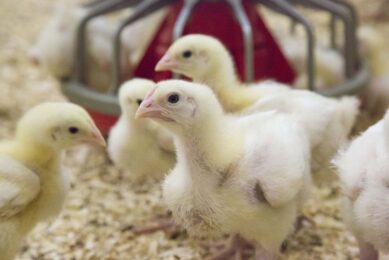Bio-available minerals essential to reduce impact of heat stress

Stress in poultry can be caused by many factors, including environment, nutrition and management, and will result in a loss of production and efficiency. High air temperatures and relative humidity are two major contributors to stress. These can increase the bird’s core body temperature beyond normal limits, causing a damaging condition known as heat stress.
Optimal production and performance occurs when birds are at thermoneutrality, meaning that body heat production is at its lowest. Above the zone of thermoneutrality, between 18-24°C (65-75°F), the bird’s ability to effectively dissipate heat disappears. At 29°C (85°F), birds start showing signs of distress. Air temperatures approaching or exceeding 37°C (100°F) can be lethal (Noll). Heat stress manifests in several ways, each with its own detrimental effects (see Box).
Increased temperatures, and in some climates increased humidity, are unavoidable in the summer months and, depending on house type and ventilation system, thermoneutrality may be hard to maintain. However, we can control many management and nutrition factors to support poultry through these challenges. As an example, when birds — especially young birds or laying hens in production — are consuming less feed, it is imperative that minerals that are vital for pullet uniformity, skeletal structure and eggshell formation, are readily available.
Crucial minerals
Organic minerals, such as those found in Bioplex and Sel-Plex, are crucial during these stressful times. Organic minerals are metals that are chelated, complexed or covalently bonded to amino acids. There are many types on the market but not all are the same or have the same impact on performance and production. For example, the minerals in Bioplex are metal proteinate chelates which are easily absorbed and readily metabolised, improving animal performance and efficiency — especially when feed intakes are compromised due to heat stress.
Minerals are required for production in all seasons, with each playing an important role in tissue formation and development, skeletal development, immune response and function, as well as eggshell production and quality. If we look at several essential minerals and the role they play in production, we can understand the importance of bio-available sources and how they are utilised:
· Zinc is required for normal immune function, skeletal development and maintenance (Sahin and others, 2009). It is also an important cofactor in carbonic anhydrase activity. A zinc deficiency reduces protein synthesis, as well as impacting the transport of copper and iron in tissues.
· Copper is needed to support the mobilisation of iron from the liver and encourage the absorption of iron and zinc (Brzozowska, 1989).
· Manganese plays a vital role in growth and skeletal development, as well as being an important cofactor to various enzymes involved with eggshell formation (Olgun, 2017).
· Selenium supports numerous metabolic processes and is imperative in reproductive health and immune function (Kumbhar and others, 2018). It also acts as an antioxidant and protects tissue health (Beck, 2007).
Planning
When planning management and nutrition for warmer weather, producers should consider including organic minerals such as those found in Bioplex and Sel-Plex. With their optimal bio-availability, these technologies provide an essential tool to support poultry health, well-being and productivity under heat stress conditions.
References available on request.












